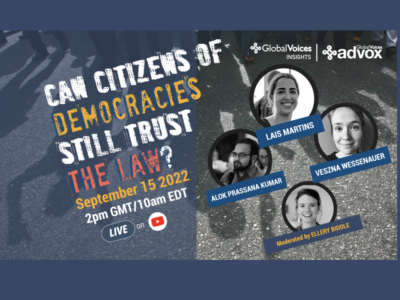Stories about Internet governance
Unfreedom Monitor Report: Egypt
Advox research into digital authoritarianism in Egypt is now in a report. Read an excerpt and download the full pdf.
LIVE on September 15: Can citizens of democracies still trust the law?
As digital authoritarianism spreads globally, is the law, one of the pillars of democracy, being used to undermine people's rights?
Unfreedom Monitor report: Zimbabwe
Advox research into digital authoritarianism in Zimbabwe is now in a report. Read an excerpt and download the full pdf.
Unfreedom Monitor Report: Russia
Advox research into digital authoritarianism in Russia is now in a report. Read an excerpt and download the full pdf.
Unfreedom Monitor Report: India
Advox research into digital authoritarianism in India is now in a report. Read an excerpt and download the full pdf.
Unfreedom Monitor Report: Turkey
Advox research into digital authoritarianism in Turkey is now in a report. Read an excerpt and download the full pdf.
Under BTK's eye: investigation reveals Turkey's information and communication authority has been collecting private user data for over a year
The private user data collected by the Turkey's Information and Communication Technologies Authority (BTK) has been described by main opposition party as the biggest tapping scandal in the history of the Republic.
Unfreedom Monitor Report: Sudan
Advox research into digital authoritarianism in Sudan is now in a report. Read an excerpt and download the full pdf.
How the government in Sudan legalized internet categorizing and content filtering
One regulation obliges telcos to block and filter a list of URLs, and to “daily monitor” the filtering equipment to verify that it is being updated.
War in Ukraine is fundamentally changing the relationship between the internet and geopolitics
Russia's invasion of Ukraine confirmed what internet and war scholars have long predicted: the line between civil and military reality is being erased, further fracturing the world along "sovereign internets."
Unfreedom Monitor Report: Brazil
Advox research into digital authoritarianism in Brazil is now in a report. Read an excerpt and download the full pdf.
Access the Unfreedom Monitor database
The Unfreedom Monitor is an Advox initiative to deepen our understanding of the relationship between technology and authoritarian power. In the first phase of this project, researchers working in 11 countries and four key themes conducted analysis of incidents, narratives, and media items, to explain acts of digital authoritarianism and...
China: Possible police database breach exposes at least 1 billion citizens’ personal data
"...the data breach is a fresh new case of a dictator’s dilemma: the more you concentrate, the more you lose control."
India pushes for storage of private data using technology built for anonymity
As VPNs and blockchain-based services are often designed to assure user anonymity and privacy, this direction might force many service providers to shut down operations in India.
Not Yet Uhuru: Surveillance, censorship and data practices in the new Tanzania
Internet censorship in Tanzania has taken on a rather oppressive turn in the last five years, with media suppression taking the lead.Internet censorship in Tanzania has taken on a rather oppressive turn in the last five years, with media suppression taking the lead.
How Russia makes laws to support networked authoritarianism
Russian lawmakers and government have created a sprawling web of new laws and amendments to police citizen activity and speech, pressure independent media and bring tech companies to heel.
What does Russia's new “hostage-taking” law mean for social media companies?
The new law imposes new obligations on popular foreign websites and social media platforms with over half a million daily Russian users, asking them to register legal entities in Russia.
In Nigeria, the government weaponises the law against online expression
The Nigerian Communications Act of 2003 (NCA) has been employed by the government in justifying various violations of online freedom of expression in Africa's most populous nation.
Pakistan's proposed media development authority could further curb freedom of media
The representatives of different press clubs of the country have declared the proposed Pakistan Media Development Authority (PMDA) “a media martial law” and rejected it outright.
In the age of misinformation, who holds the power to categorize the ‘truth'?
Over time, the categorization of information can result in the dominance of a single world view, making platforms like Facebook, Twitter and Google the central arbiters of truth.




















